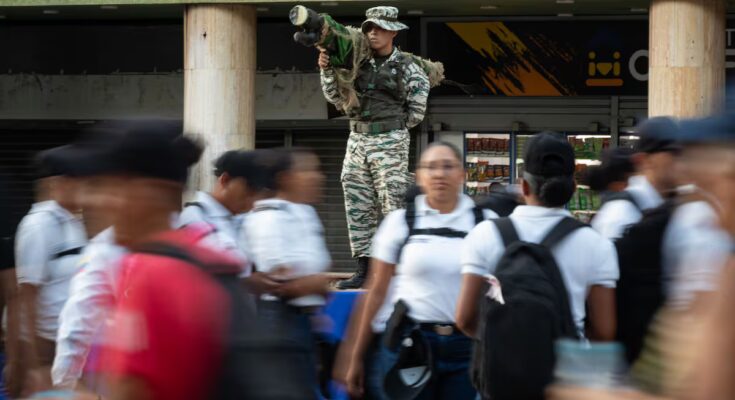While tensions with the United States remain high, the arrival of the huge aircraft carrier is awaited Gerard Ford in the waters of the Caribbean Sea, Venezuela has begun to receive specific military weapons sent by the Russian Federation to strengthen its lines, as confirmed by the governments of both countries.
So far we note the arrival of the Pantsir F-1 and Buk-M2E air defense systems, brought to strengthen the national air defense park, – with its 5,000 Igla-S missiles, also of Russian manufacture -, considered the most advanced in Latin America. Russian officials have already spoken publicly about the possibility of giving Venezuela the Oreshnik hypersonic ballistic missile and Kalibr cruise missiles.
“We are in permanent contact with our friends in Venezuela,” admitted Dimitri Peskov, spokesman for the Russian presidency, commenting on Caracas’ approach to Moscow, seeking help in response to the accusations made against Maduro by the United States. Peskov alluded to the existence of “contractual obligations” between the two countries.
In May this year, Venezuela and Russia signed an ambitious “strategic partnership agreement” that expanded the framework of cooperation between the two countries, with a very special chapter in the military sector, one of the fields of work in which the two countries have been able to more effectively deepen their mutual interests.
“We reaffirm our firm support for the Venezuelan authorities in defending their national sovereignty,” said María Zajarova, spokeswoman for the Russian Foreign Ministry, who warned: “Direct aggression by the United States will aggravate the situation instead of solving problems that have all the potential to be resolved legally and diplomatically.”
Deputy Alexei Zhuravlyov, deputy chairman of the defense committee of the Duma (the Russian parliament), also confirmed that Russia “is already supplying weapons to Venezuela that significantly strengthen its air defense capability”, suggesting that the White House “may have surprises” if it decides to attack the country.
While all this was happening, two American B-52 bombers were flying over the vicinity of Venezuelan airspace, about 70 kilometers from the coast, dissuasive maneuvers already carried out in these three months of tension between the two countries.
In recent days, news versions have emerged documenting the doubts that Donald Trump expressed to his closest collaborators on the possibility of militarily attacking Venezuela, calibrating, in particular, the possibilities of political failure. In recent days, faced with insistent questions from the press, a doubtful Trump had even stated that he had no intention of attacking Venezuela.
The head of the US Southern Command, Alvin Holsey, has meanwhile visited the amphibious assault ship USS Iwo Jimaone of the many members of the already dense US military arsenal stationed along the arc of the Venezuelan coast, “to observe the work of the United States Navy and Marine Corps in the Caribbean”, in the midst of the anti-drug operation announced by the Trump administration.
According to information leaked to the American press, Holsey would be close to resigning from his position, also due to differences with Defense Secretary Pete Hegseth, who expected a more decisive attitude from him to accompany the military measures.
To carry out this operation, the United States has deployed in the Caribbean, opposite Venezuela, a military force consisting of: 4,500 marines and a significant number of amphibious assault ships, destroyers, guided missile cruisers, littoral combat ships, nuclear-powered attack submarines, transport and combat helicopters, fighter and reconnaissance aircraft, long-range bombers and fixed-wing gunships.
In the development of this strategy, the most important figures of the Trump government – in particular the Secretary of State, Marco Rubio, but also several spokespersons of the federal government map – have issued insistent statements in which they directly accuse Nicolás Maduro for his alleged links with the Cartel of the Suns and the criminal multinational of Venezuelan origin El Tren de Aragua, and for the “illegitimate” character of his presidential mandate.
In recent days, rumors have increased about a possible halt or postponement of the United States’ plans with the Maduro government. For her part, opposition leader María Corina Machado reiterated that the Trump government’s strategy against the Venezuelan regime is “absolutely correct.” Machado continues to assure that Maduro’s regime “is very weak” and that the Venezuelan crisis “is in the process of being resolved”.



